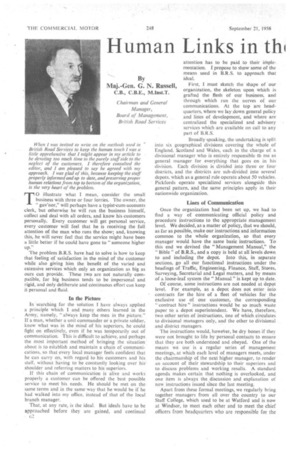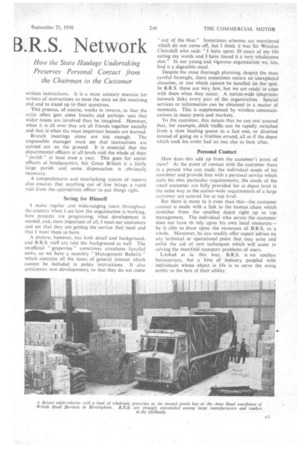Human Links in thl
Page 120

Page 121

If you've noticed an error in this article please click here to report it so we can fix it.
B.R.S. Network
By Maj.-Gen. G. N. Russell,
C.B., C.B.E., Minst.T.
When I was invited to write on the methods used in British Road Services to keep the human touch I was a little apprehensive that I might appear in my article to be devoting too much time to the purely staff side to the neglect of the customers. I therefbre consulted the editor, and I am pleased to say he agreed with my approach. I was glad of this, because keeping the staff properly informed and up to date, and preserving proper human relations from fop to bottom of the organization, is the very heart of the problem.
T0 illustrate what I mean, consider the small business with three or four lorries. The owner, the " guv'nor," will perhaps have a typist-cum-accounts clerk, but otherwise he will run the business himself, collect and deal with alt orders, and know his customers personally. Every customer will get personal service, every customer will feel that he is receiving the full attention of the man who runs the show; and, knowing this, he will never feel that the service might have been a little better if he could have gone to "someone higher up."
The problem B.R.S. have had to solve is how to keep that feeling of satisfaction in the mind of the customer while also giving him the benefit of the varied and extensive services which only an organization as big as ours can provide. These two are not naturally compatible, for big business tends to be impersonal and rigid, and only deliberate and continuous effort can keep it personal and fluid.
In the Picture • In 'searching for the solution I have always applied a principle which I and many others learned in the Army, namely, "always keep the men in the picture." If a man, whether a unit commander or a private soldier, knew what was in the mind of his superiors, he could fight on effectively, even if he was temporarily out of communication. This is difficult to achieve, and perhaps the most important method of bringing the situation about is to establish and maintain a chain of communications, so that every local manager feels confident that he can carry on, with regard to his customers and his staff, without having to be constantly looking over his' shoulder and referring matters to his superiors.
If this chain of communication is alive and works properly a customer can be offeredthe best possible service to meet. his needs. He should be met on the same terms and in the same-way that he would be if he had walked into my office, instead of that of the local branch manager.
That, at any rate, is the ideal. But ideals have to be approached before they are gained, and continual
attention has to be paid to their implementation. I propose to show some of the means used in B.R.S. to approach that ideal.
First, I must sketch the shape of our organization, the skeleton upon which is grafted the flesh of our business, and through which run the nerves of our communications. At the top are headquarters, where we lay down general policy and lines of development, and where are centralized the specialized and advisory services which are available on call to any part of B.R.S.
Broadly speaking, the undertaking is split into six geographical divisions covering the whole of England, Scotland and Wales, each in the charge of a divisional manager who is entirely responsible tia me as general manager for everything that goes on in his division. Each division is divided into three or four districts, and the districts are sub-divided into several depots, which as a general rule operate about 50 vehicles. Pickfords operate specialized services alongside this general pattern, and the same principles apply in their nationwide organization.
Lines of Communication Once the organization had been set up, we had to find a way of communicating official policy and procedure instructions to the appropriate management level. We decided, as a matter of policy, that we should, as far as possible, make our instructions and information common to the whole organization, so that every manager would have the same basic instructions. To this end we devised the "Management Manual," the " Bible " of B.R.S., and a copy is held at all levels down to and including the depot. Into this, in separate sections, go all our functional instructions under the headings of Traffic, Engineering, Finance, Staff, Stores, Surveying, Secretarial and Legal matters, and by means of a loose-leaf system the " Manual " is kept up to date.
Of course, some instructions are not needed at depot level. For example, as a depot does not enter into contracts for the hire of a fleet of vehicles for the exclusive use of one customer, the corresponding contract hire" instructions would be so much waste paper to a depot superintendent. We have, therefore, two other series of instructions, one of which circulates to divisional managers only, and the other to divisional and district managers The instructions would, howeVer, be dry bones if they were not brought to Life by personal contacts to ensure that they are both understood and obeyed. One of the means we use is a regular series of management meetings, at which each level of managers meets, under the chairmanship of the next higher manager, to render an account of their stewardship to their superiors and to discuss problems and working results. A standard agenda makes certain that nothing is overlooked, and one item is always the discussion and explanation or new instructions issued since the last meeting.
Apart from these formal meetings, we regularly bring together managers from all over the country to our Staff College, which used to be at Watford and is now at Windsor, to meet each other and to meet the chief officers from headquarters who are responsible for the
written instructions. It is a most salutary exercise for writers of instructions to meet the men on the receiving end and to stand up to their questions.
This process, of course, works in reverse, in that the critic often gets some knocks and perhaps sees that wider issues are involved than he imagined. However, when it is all over they are all friends together socially and that is when the most important lessons are learned.
Branch meetings alone are not enough. The responsible manager must see that instructions are carried out on the ground, It is essential that the departmental officers at all levels visit the whole of their parish " at least once a year. This goes for senior officers at headquarters, but Great Britain is a fairly large parish and some dispensation is obviously. necessary.
A comprehensive and interlocking system of reports also ensures that anything out of line brings a rapid visit from the. appropriate officer to put things right.
Seeing for Himself I make regular and wide-ranging tours throughout the country when I see how the organization is working, how projects are progressing, what development is needed, and, most important of all, 1 meet our customers and see that they are getting the service they need and that I want them to have.
A picture, however, has both detail and background, and B.R.S. staff are told the background as well. The unofficial "grapevine" sometimes circulates fanciful news, so we have a monthly 'Management Bulletin" which contains all the items of general interest which cannot be included in policy instructions. It also anticipates new developments, so that they do not come
"out of the blue." Sometimes schemes are mentioned which do not come off, but I think it was Sir Winston Churchill who said " I have spent 30 years of my life eating my words and I have found it a very wholesome diet." In our young and vigorous organization we, too, find it a digestible meal.
Despite the most thorough planning, despite:the most careful foresight, there sometimes occurs an unexpected situation, or one which cannot be handled on the spot. In B.R.S. these are very few, but we are ready to cope with them when they occur. A nation-wide teleprinter network links every part of the organization. Special services or information can be obtained in a matter of moments. This is supplemented by wireless communications in many ports and markets.
To the customer, this means that he can rest assured that, for example, dock traffic can be rapidly switched from a stow loading queue to a fast one, or diverted instead of going on a fruitless errand, all as if the depot which took his order had no one else to look after.
Personal Contact
How does this add up from the customer's point of view? At the point of contact with the customer there is a person who can study the individual needs of his customer and provide him with a personal service which suits his own particular requirements; the needs of the small customer are fully provided for at depot level in the same way as the nation-wide requirements of a large customer are catered for at top level.
But there is more to it even than this—the customer contact is made with a link in the human chain which stretches from the smallest depot right up to top management. The individual who serves the customer does not have to rely upon his own local resources — he is able to draw upon the resources of B.R.S. as a whole. Moreover, he can readily offer expert advice on any technical or operational point that may arise and enlist the aid of new technique's which will assist in solving the manifold transport problems of users.
Looked at in this way, B.R.S. is no soulless bureaucracy, but a hive of industry peopled with individuals whose object in life is to serve the using public to the best of their ability.




































































































































































































































































































































